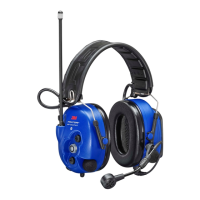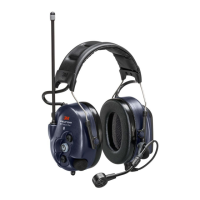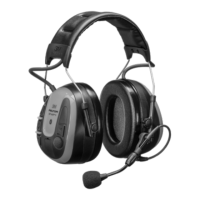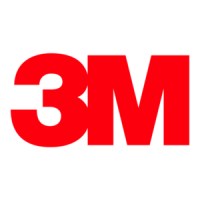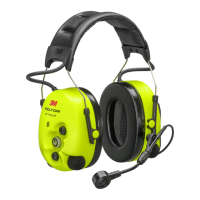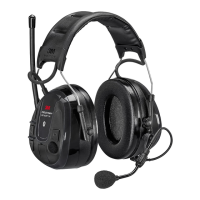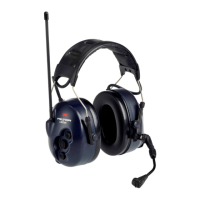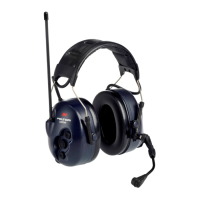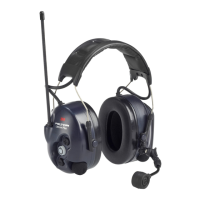Attenuation Data
3M
™
PELTOR
™
WS
™
LiteCom Pro III Headset, Headband MT73H7A4D10EU, MT73H7F4D10EU-50 AS/NZS 1270:2002
Test Frequency (HZ) 125 250 500 1000 2000 4000 8000 SLC
80
Class Clamp Force
Mean Attenuation (dB)
20.7 23.9 32.0 33.9 36.1 39.6 39.6
32dB 5 14.1 NStandard Deviation (SD) (dB)
3.5 3.3 4.0 2.2 3.7 2.6 3.3
Means minus SD (dB)
17.2 20.6 28.0 31.7 32.4 37.0 36.3
Hearing protector Class 5 tested to AS/NZS1270. When selected, used and maintained as specied in AS/NZS1269, this protector
may be used in noise up to 110dB(A) assuming an 85dB(A) criterion. A lower criterion may be require a higher protection class.
3M
™
PELTOR
™
WS
™
LiteCom Pro IIII Headset, Neckband MT73H7B4D10EU, MT73H7B4D10EU-50 AS/NZS 1270:2002
Test Frequency (HZ) 125 250 500 1000 2000 4000 8000 SLC
80
Class Clamp Force
Mean Attenuation (dB) 16.1 18.6 30.1 36.0 37.4 38.0 37.7
30dB 5 12.6 NStandard Deviation (SD) (dB) 3.3 4.0 3.8 3.8 4.2 3.7 4.2
Means minus SD (dB) 12.8 14.6 26.3 32.2 33.2 34.3 33.5
Hearing protector Class 5 tested to AS/NZS1270. When selected, used and maintained as specied in AS/NZS1269, this protector
may be used in noise up to 110dB(A) assuming an 85dB(A) criterion. A lower criterion may be require a higher protection class.
3M
™
PELTOR
™
WS
™
LiteCom Pro III Headset, Helmet Attach MT73H7P3E4D10EU*, MT73H7P3E4D10EU-50* AS/NZS 1270:2002
Test Frequency (HZ) 125 250 500 1000 2000 4000 8000 SLC
80
Class Clamp Force
Mean Attenuation (dB) 19.1 20.0 28.4 32.2 34.5 35.9 36.7
29dB 5 11 NStandard Deviation (SD) (dB) 4.4 4.8 4.6 3.0 3.2 3.9 4.6
Means minus SD (dB) 14.7 15.2 23.8 29.2 31.3 32.0 32.1
Hearing protector Class 5 tested to AS/NZS1270. When selected, used and maintained as specied in AS/NZS1269, this protector
may be used in noise up to 110dB(A) assuming an 85dB(A) criterion. A lower criterion may be require a higher protection class.
* These earmus were tested in combination with the HC600 industrial safety helmet using the P3G adapter and may give
dierent levels of protection if tted to dierent helmets.
Mean = Mean attenuation value derived from testing in accordance with AS/NZS 1270:2002.
SD = Standard Deviation derived from testing in accordance with AS/NZS 1270:2002.
Mean-SD = Mean attenuation value minus Standard Deviation
SLC
80
= Single number rating commonly used in Australia and New Zealand to compare acoustic performance of hearing
protectors. The subscript ‘80’ indicates that in well managed hearing protector programs, the protection provided is expected to
equal or exceed the SLC80 in 80% of protector-wearer noise spectrum combinations.
Class = A simplied process for selecting hearing protectors based on the wearers 8-hour equivalent continuous A-weighted
sound pressure level.
3M strongly recommends personal t testing of hearing protectors. Research suggests that users may receive less noise
reduction than indicated by the attenuation label value(s) on the packaging due to variation in t, tting skill, and motivation of
the user. Refer to applicable regulations and guidance on how to adjust attenuation label value(s). In the absence of applicable
regulations, it is recommended that the attenuation label value(s) be reduced to better estimate typical protection.
The eectiveness of a hearing protector reduces dramatically when the hearing protector does not t properly, is incorrectly
inserted or is not worn 100% of the time during ALL hazardous noise events. Removal of the hearing protector, even for brief
moments, substantially reduces protection and greatly increases the risk of hearing damage.
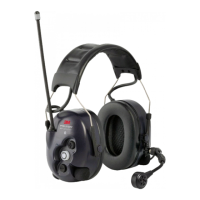
